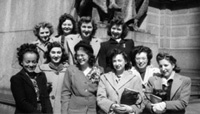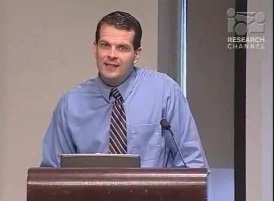Computers & Ethics
November 10, 2007 #publications
Nathan Ensmenger, “Computers as Ethical Objects,” IEEE Annals of the History of Computing 29:3 (2007), 86-88.
Top-Secret Rosies
July 16, 2007 #media

I just finished filming a segment for a documentary by local film-maker LeAnn Erikson. I was just one of the talking-head historians. The real heroes of the film are the women who worked as mathematicians and “human computers” during the Second World War (including those who programmed the ENIAC computer right here at the Moore School of Electrical Engineering).
View the trailer online.
The Research Channel II
July 16, 2007 #media
Case Files in the History of Computing

This is the second in a series of symposium hosted by the Franklin Institute and the History & Sociology of Science department celebrating the opening of a new section of the electronic case files archives.
The focus of the presentation was on the early history of the computing industry, featuring key individuals including Hollerith, Burroughs, Eckert, Mauchly, Bardeen, Brittain, and Shannon. Professor Ensmenger provided a general overview of the history of computing.
The full video can be is running on the Research Channel.
Resistance is Futile
May 10, 2007 #publications
Nathan Ensmenger, “Resistance is Futile? Reluctant and Selective Users of the Internet” in P. Ceruzzi and W. Aspray, The Commercialization of the Internet and Its Impact on American Business (MIT Press, forthcoming)
Download the pdf of the draft version of this paper.
University of Wisconsin
May 10, 2007 #media
On February 20th, 2007, Dr. Ensmenger will be giving a talk at the University of Wisconsin entitled “Neither Luddites nor Sages: Physicians and Professors as Reluctant Users of the Internet.”
The seminar is funded by the UW-Madison Holtz Center for Science and Technology Studies, and sponsored by the UW-Madison School of Library and Information Studies.
See the full poster.
Society for the History of Technology Annual Conference 2006
December 13, 2006 #media

This paper was based on some research that I am currently developing on the history of decision technologies.
From the paper:
“It is also clear that no-one quite knows what to do with software; computer science focuses on software as algorithm; history of computer science is often told as old-style intellectual history; this is obviously insufficient, software sits uncomfortably between science technology; not a thing, an yet clearly constructed; invisible, ethereal, often ephemeral; also not clear what exactly constitutes software; programs, practices, people; software is perhaps the ultimate heterogenous system…
“And so his paper represents an attempt to think seriously about software as a material artifact, as a technology embedded in systems of practice, networks of exchange…”

